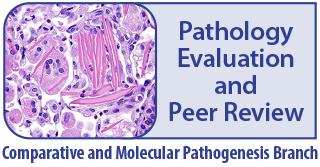
Much of the work carried out by DTT is in support of the National Toxicology Program (NTP), an interagency partnership of the Food and Drug Administration, National Institute for Occupational Safety and Health, and NIEHS.

Research Summary

The Pathology Evaluation and Peer Review (PEPR) Group provides support to NIEHS, including studies conducted by the Division of Translational Toxicology (DTT). The group participates in and oversees pathology-related issues for rodent toxicology studies and other studies, including study design and management, data analysis, peer review, and reporting.
The PEPR Group provides pathology expertise to evaluate findings, interpret those findings, and works with other staff to determine the toxicologic potential of substances studied by the DTT. Staff within the Data Coordination Unit (DCU) receive, track, and assist with finalizing the pathology data. Many of these studies are conducted on behalf of the National Toxicology Program (NTP) and include studies to evaluate the effects of environmental substances on general toxicity, carcinogenicity, neurodevelopment, reproduction and development, and the immune, nervous systems, and cardiovascular systems. These studies are reported in peer-reviewed NTP technical reports and journal manuscripts.
The PEPR Group also works with NIEHS investigators to provide pathology expertise regarding study design and special techniques; data evaluation, management, and interpretation; and interpretation and reporting of findings. These include studies using rodent models of disease (such as genetically modified models) and/or in vitro studies to identify environmental hazards or investigate the mechanisms involved in human diseases, toxicity, or carcinogenesis. This research has resulted in numerous publications that elucidated the mechanisms of environmental carcinogenesis.
Nonneoplastic Lesion Atlas
The PEPR Group has taken the lead to develop the NTP Nonneoplastic Lesion Atlas (NNLA). The NNLA is a searchable, web-based atlas with thousands of high-quality, zoomable images and diagnostic guidelines for microscopic nonneoplastic lesions in rats and mice. Development of the NNLA is the result of efforts within the Comparative and Molecular Pathogenesis Branch to streamline pathology data management and interpretation, improve the efficiency and consistency of pathologic diagnoses, and facilitate cross study comparisons, and.
Mark Cesta, D.V.M., Ph.D., D.A.C.V.P leads the PEPR Group. Cesta earned his D.V.M. from Colorado State University and Ph.D. from North Carolina State University. He has over15 years of experience in toxicologic pathology. Cesta has also published over 40 peer-reviewed articles as well as several book chapters. He was an NIEHS postdoctoral fellow (2003-2005) and toxicologic pathologist at Integrated Laboratory Systems (2005-2007) before joining NIEHS in 2007.
Recent Publications
- Steinbach T, Tokarz D, Co C, Harris S, McBride S, Shockley K, Lokhande A, Srivastava G, Ugalmugle R, Kazi A, Singletary E, Cesta M, Thomas H, Chen V, Hobbie K, Crabbs T. Inter-Rater and Intra-Rater Agreement in Scoring Severity of Rodent Cardiomyopathy and Relation to Artificial Intelligence-Based Scoring. Toxicologic pathology. 2024 Jul;52(5):258-265. [ AbstractSteinbach T, Tokarz D, Co C, Harris S, McBride S, Shockley K, Lokhande A, Srivastava G, Ugalmugle R, Kazi A, Singletary E, Cesta M, Thomas H, Chen V, Hobbie K, Crabbs T. Inter-Rater and Intra-Rater Agreement in Scoring Severity of Rodent Cardiomyopathy and Relation to Artificial Intelligence-Based Scoring. Toxicologic pathology. 2024 Jul ]
- Fessler M, Madenspacher J, Baker P, Hilligan K, Bohrer A, Castro E, Meacham J, Chen S, Johnson R, McDonald J, Martin N, Tucker C, Mahapatra D, Cesta M, Mayer-Barber K. Endogenous and Therapeutic 25-Hydroxycholesterols May Worsen Early SARS-CoV-2 Pathogenesis in Mice. American journal of respiratory cell and molecular biology. 2023 Dec;69(6):638-648. [ AbstractFessler M, Madenspacher J, Baker P, Hilligan K, Bohrer A, Castro E, Meacham J, Chen S, Johnson R, McDonald J, Martin N, Tucker C, Mahapatra D, Cesta M, Mayer-Barber K. Endogenous and Therapeutic 25-Hydroxycholesterols May Worsen Early SARS-CoV-2 Pathogenesis in Mice. American journal of respiratory cell and molecular biology. 2023 Dec ]
- Frawley R, Johnson V, Burleson G, Shockley K, Cesta M, Travlos G, Cora M, Roberts G, Germolec D. Evaluation of immunotoxicity of sodium metavanadate following drinking water exposure in female B6C3F1/N mice in a 28-day study. Journal of applied toxicology : JAT. 2023 Nov;43(11):1686-1701. [ AbstractFrawley R, Johnson V, Burleson G, Shockley K, Cesta M, Travlos G, Cora M, Roberts G, Germolec D. Evaluation of immunotoxicity of sodium metavanadate following drinking water exposure in female B6C3F1/N mice in a 28-day study. Journal of applied toxicology : JAT. 2023 Nov ]
- Fessler M, Madenspacher J, Baker P, Hilligan K, Castro E, Meacham J, Chen S, Johnson R, Martin N, Tucker C, Mahapatra D, Cesta M, Mayer-Barber K. Evaluation of endogenous and therapeutic 25-hydroxycholesterols in murine models of pulmonary SARS-CoV-2 infection. bioRxiv : the preprint server for biology. 2022 Sep 13 [Epub ahead of print]. [ AbstractFessler M, Madenspacher J, Baker P, Hilligan K, Castro E, Meacham J, Chen S, Johnson R, Martin N, Tucker C, Mahapatra D, Cesta M, Mayer-Barber K. Evaluation of endogenous and therapeutic 25-hydroxycholesterols in murine models of pulmonary SARS-CoV-2 infection. bioRxiv : the preprint server for biology. 2022 Sep 13 ]
- Tokarz D, Gruebbel M, Willson G, Hardisty J, Pearse G, Cesta M. Spontaneous Primary Pleural Mesothelioma in Fischer 344 (F344) and Other Rat Strains: A Retrospective Review. Toxicologic pathology. 2022 Feb;50(2):167-175. [ AbstractTokarz D, Gruebbel M, Willson G, Hardisty J, Pearse G, Cesta M. Spontaneous Primary Pleural Mesothelioma in Fischer 344 (F344) and Other Rat Strains: A Retrospective Review. Toxicologic pathology. 2022 Feb ]
NTP Reports
- National Toxicology Program. Toxicity study of Stachybotrys chartarum (CASRN 67892-26-6) administered by inhalation to B6C3F1/N mice. Toxicity report series. 2024 Oct [Epub ahead of print]. [ AbstractNational Toxicology Program. Toxicity study of Stachybotrys chartarum (CASRN 67892-26-6) administered by inhalation to B6C3F1/N mice. Toxicity report series. 2024 Oct ]
- National Toxicology Program. Toxicology and carcinogenesis study of triclosan administered dermally to B6C3F1/N mice. National Toxicology Program technical report series. 2024 May [Epub ahead of print]. [ AbstractNational Toxicology Program. Toxicology and carcinogenesis study of triclosan administered dermally to B6C3F1/N mice. National Toxicology Program technical report series. 2024 May ]
- National Toxicology Program. Toxicology and carcinogenesis studies of black cohosh root extract (CASRN 84776-26-1) administered by gavage to Sprague Dawley (Hsd:Sprague Dawley SD) rats and female B6C3F1/N mice. National Toxicology Program technical report series. 2023 Dec [Epub ahead of print]. [ AbstractNational Toxicology Program. Toxicology and carcinogenesis studies of black cohosh root extract (CASRN 84776-26-1) administered by gavage to Sprague Dawley (Hsd:Sprague Dawley SD) rats and female B6C3F1/N mice. National Toxicology Program technical report series. 2023 Dec ]
- National Toxicology Program. Toxicology and carcinogenesis studies of an isomeric mixture of tris(chloropropyl) phosphate administered in feed to Sprague Dawley (Hsd:Sprague Dawley SD) rats and B6C3F1/N mice. National Toxicology Program technical report series. 2023 Jun [Epub ahead of print]. [ AbstractNational Toxicology Program. Toxicology and carcinogenesis studies of an isomeric mixture of tris(chloropropyl) phosphate administered in feed to Sprague Dawley (Hsd:Sprague Dawley SD) rats and B6C3F1/N mice. National Toxicology Program technical report series. 2023 Jun ]
- National Toxicology Program. Toxicity studies of acetoin and 2,3-pentanedione administered by inhalation to Wistar Han [Crl:WI(Han)] rats and B6C3F1/N mice. Toxicity report series. 2023 Mar [Epub ahead of print]. [ AbstractNational Toxicology Program. Toxicity studies of acetoin and 2,3-pentanedione administered by inhalation to Wistar Han [Crl:WI(Han)] rats and B6C3F1/N mice. Toxicity report series. 2023 Mar ]


